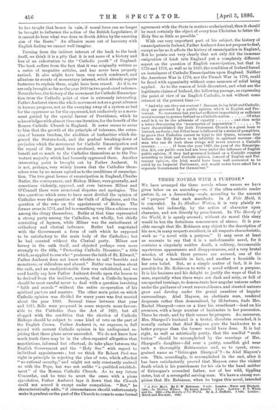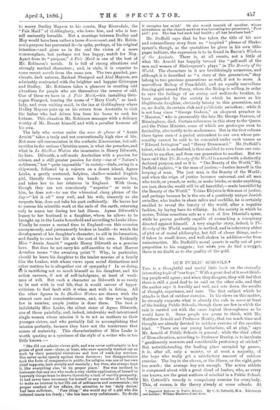THREE NOVELS WITH A PURPOSE.* WE have arranged the three
novels whose names we have given below on an ascending—or, if the ultra-artistic reader prefers it, on a descending—scale, according to the amount of " purpose" that each manifests. In A Fair Maid, it is concealed. In In, Shallow Waters, it is very plainly re- vealed, but indirectly, by the action of character upon character, and not directly by preachmeut. In The Beauty of the World, it is openly avowed ; without its moral this story would be but the fortuitous concurrence of atoms. It is pos- sible enough that Mr. Robinson may object to the description of his new, in many respects excellent, in all respects characteristic, work as " a novel with a purpose." It may seem at least as accurate to say that it is a melodramatic novel, for it contains a singularly sudden death, a robbery, innumerable mysterious appearances and disappearances, and a very brutal murder, of which three persons are accused, one of the three being a homicide in fact, and another a homicide in her own belief. But, as a simple matter of fact, it is im- possible for Mr. Robinson to write a novel without a purpose. It is his business and his delight to justify the ways of God to man, especially when these ways are dark and miry, or full of unexpected turnings, to demonstrate how angular natures soften under the guidance of sweet reasonableness, and stunted natures grow and develop under the genial sunshine of happier surroundings. Abel Mayson, an obstinate man, rendered desperate rather than demoralised, by ill-fortune, finds Mrs. Rachel Shargool—once on a time his sweetheart—dead on his premises, with a large number of banknotes in her possession. These he steals, and by their means he prospers. As, moreover, Mrs. Shargool's husband is a brutal, dissolute scoundrel, it is morally certain that Abel Mayson puts the banknotes to a better purpose than the former would have done. It is but right, as well as artistically pretty. that the needful " resti- tution " should be accomplished by the marriage of Mrs. Shargool's daughter—did ever a pretty, unselfish girl wear such a thoroughly Robinsonian and, so to speak, cross- grained name as " Grizzogan Shargool"?— to Abel Mayson's son. This, accordingly, is accomplished in the end, after it has been satisfactorily proved that Mayson owes the violent death which is his punishment for his sin to the hand neither of Grizzogan's scoundrel father, nor of her wild, tippling sister, but of a revengeful serving-man. We have a strong sus- picion that Mr. Robinson, when he began this novel, intended
• A Fair Maid. By F. W. Robinson. 3 vol.. London : Hurst and Blaokett. 1886.—In Shallow Waters. By Annie Armitt. 2 vols. London : F. V. White and Co. 1886.—The Beauty of the World. By A. J. Duffield. 3 vols. London Hurst and Blaokett. 1886.
to marry Dudley Mayson to his cousin, May Riversdale, the "Fair Maid" of Goldingbury, who loves him, and who is her- self eminently loveable. But a marriage between Dudley and May would have been rather a tame denouement, and Mr. Robin- son's purpose has prevented it—in spite, perhaps, of his original intention—and gives us in the end the vision of a more commonplace, but perhaps not less happy, match for May.
Apart from its " purpose," A Fair Maid is one of the best of Mr. Robinson's novels. It is full of strong situations and strongly marked characters ; and, in style, it is superior to some recent novels from the same pen. The two gnarled, pas- sionate, dark natures, Rachael Shargool and Abel Mayson, are admirably contrasted with the brighter and happier Grizzogan and Dudley. Mr. Robinson takes a pleasure in creating odd situations for people who are themselves the reverse of odd. One of these we have in A Fair Maid,—his installing Griz- zogan Shargool, bearing the name of " Mary Croft," as land- lady, and even waiting-maid, in the inn at Goldingbury where Dudley Mayson puts up on his return from Australia to visit the father who had driven him from his home to seek his fortune. This situation Mr. Robinson manages with a delicacy worthy of Mr. Besant himself, and with a peculiar humour all his own.
The lady who writes under the nom de plume of " Annie Armitt" takes a truly and not conventionally high view of life.
Not mere self-renunciation in the msthetic Emersonian, but self- sacrifice in the serious Christian sense, is what she preaches, and what in In Shallow Waters she incarnates in Henry Dilworth, its hero. Dilworth, a self-made Australian with a passion for science, and a still greater passion for duty—one of "Nature's noblemen," but " quite impossible " in society—finds, owing to a shipwreck, followed by a sojourn on a desert island, Agnes Lealie, a gently nurtured, helpless, shallow-minded English girl, literally thrown upon his hands. He marries her, and takes her to her relatives in England. With them, though they are not consciously " superior " or rode to him, he does not—to use the whimsical slang phrase of the day—" hit it off " very well, and his wife, sincerely as she respects him, does not take his part sufficiently. He leaves her to pursue his scientific work at the ends of the earth, returning only to nurse her during her last illness. Agnes Dilworth's legacy to her husband is a daughter, whom he allows to be brought up in the Leake household and according to Leake ideas.
Finally he comes a second time to England—on this occasion anonymously, and permanently broken in health—to watch the development of his daughter's character, to aid in its formation, and finally to save her life at the cost of his own. Evidently Miss " Annie Armitt " regards Henry Dilworth as a genuine hero. But does he not carry his self-sacrifice to what Marcus Aurelius terms " the sweating point "P Why, in particular, -.should he leave his daughter to the tender mercies of a family like the Leakes, with whose views upon social distinctions and other matters he is altogether out of sympathy P In so doing, he is sacrificing not so much himself as his daughter, and his action savours, if not of self-indulgence, at least of weak- ness of will. But such a character as Dilworth is so rarely to be met with in real life, that it would savour of hyper- criticism to find fault with it when met with in fiction. All the other figures in In Shallow Waters are drawn with the utmost care and conscientiousness, and, as they are happily few in number, ample justice is done them. The best is indubitably Miss Leake, the eldest sister of Agnes Dilworth, one of those painfully, and, indeed, intolerably well-intentioned single women whose mission it is to act as mothers to their younger sisters, and who probably fail in accomplishing that mission perfectly, because they have not the tenderness that comes of maternity. This characterisation of Miss Leake is worth quoting as a specimen of the style of a writer who is too little known :—
" She did not admire clever girls, and was never enthusiastic in her praise of good ones—those, at least, who were specially marked out as such by their parochial visitations and love of week-day services. She never spoke openly against these devotees ; her disapprobation took the form of compassion in public, for religion was one of her own chief supports, both socially and mentally ; but then, she always kept it, like everything else, in its proper place.' She was inclined to insinuate that any one who made a very visible application of herself to heavenly things must be drawn thereto by a lack of earthly prosperity. It had never been necessary for herself or any member of her family to make an interest in her life out of ordinances and ceremonials ; the proper conduct of her affairs, the attention to her daily duties,' had been sufficient. Poor thing !' she would say of a girl who dis- tributed tracts too freely ; she has been very unfortunate. No doubt
it occupies her mind.' Or she would remark of another, whose attendance at the church services was becoming too prominent, Poor girl ! yes. She has had such bad health ; all her brothers had."
Mr. Duffield says that he has taken the title of his new and extraordinary story from an " inspired " phrase of Shake- speare's, though, as the quotations he gives in his own title-
pages indicate, the expression is to be found in Bacon's Wisdom of the Ancients. There is, at all events, not a little of what Mr. Arnold has happily termed the " pell-mell of the
men and women of Shakespeare's plays " in The Beauty of the World. The characters in it are bewilderingly numerous, and although it is described as " a story of this generation," they belong to two previous generations as well, if not to more. A marvellous Bishop of Preachfield, and an equally marvellous dancing-girl named Pansy, whom the Bishop is willing, in order to save the feelings of an erring and well-to-do brother, to have regarded by the society in which he moves as his illegitimate daughter, obviously belong to this generation, and so, no doubt, do certain club and publicistic swindlers ; while it is not long since " George Godson," an eloquent preacher in " Masston," who is presumably the late Mr. George Dawson, of Birmingham, died. Certain references in this story to the Queen and the Prime Minister, some of which are grotesque even to farcicality, also testify to its modernness. But in the first volume there figure men of a period antecedent to our own whose per- sonality cannot be said to be concealed under such names as " Edward Irvington" and "Henry Drummard." Mr. Duffield's talent, which is undoubted, is thus enabled to rove from one con- tinent to another, and from one generation to another. But we have said that The Beauty of the World is a novel with a distinctly declared purpose, and so it is. " The Beauty of the World," Mr. Duffield explains, "is the man of justice,—Justice herself in the keeping of man. The just man is the Beauty of the World; and when the reign of justice becomes universal, and all men who trade, or preach, or write, or make bricks, or make anything, are just, then the world will be all beautiful,—made beautiful by the Beauty of the World." Tobias Elejuice is this man of justice, and perhaps because he is the son of a positively unique Jewish swindler, who trades in sham relics and suchlike, he is certainly enabled to reveal the beauty of the world, after a negative fashion, by laying bare its villainy. In the society in which he moves, Tobias sometime acts as a sort of live Ithuriel's spear, while he proves perfectly capable of unmasking a conspiracy directed against himself. A very singular story, indeed, is The Beauty of the World, wanting in method, and in coherency either of plot or of moral philosophy, but full of clever things, and— if taken in small doses, and well shaken in addition—far from uninstrnctive. Mr. Duffield's moral quartz is sadly out of pro- proportion to his nuggets ; but when you do find a nugget, there is no doubt as to the quality of the gold.



































 Previous page
Previous page